苏教版译林版英语六年级上册复习知识点汇总
苏教版译林版英语六年级上册语法复习知识点汇总-最新
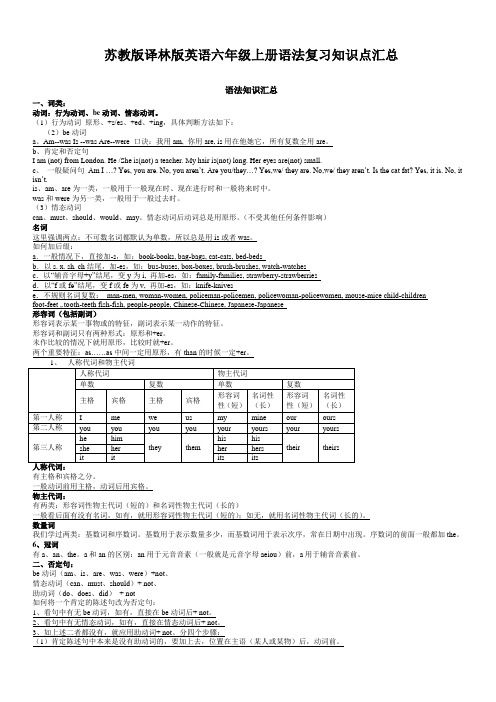
苏教版译林版英语六年级上册语法复习知识点汇总语法知识汇总一、词类:动词:行为动词、be动词、情态动词。
(1)行为动词原形、+s/es、+ed、+ing,具体判断方法如下:(2)be动词a、Am--was Is --was Are--were 口诀:我用am, 你用are, is用在他她它,所有复数全用are。
b、肯定和否定句I am (not) from London. He /She is(not) a teacher. My hair is(not) long. Her eyes are(not) small.c、一般疑问句Am I …? Yes, you are. No, you aren’t. Are you/they…? Yes,we/ they are. No,we/ they aren’t. Is the cat fat? Yes, it is. No, it isn’t.is、am、are为一类,一般用于一般现在时、现在进行时和一般将来时中。
was和were为另一类,一般用于一般过去时。
(3)情态动词can、must、should、would、may。
情态动词后动词总是用原形。
(不受其他任何条件影响)名词这里强调两点:不可数名词都默认为单数,所以总是用is或者was。
如何加后缀:a.一般情况下,直接加-s,如:book-books, bag-bags, cat-cats, bed-bedsb.以s. x. sh. ch结尾,加-es,如:bus-buses, box-boxes, brush-brushes, watch-watchesc.以“辅音字母+y”结尾,变y为i, 再加-es,如:family-families, strawberry-strawberriesd.以“f或fe”结尾,变f或fe为v, 再加-es,如:knife-knivese.不规则名词复数:man-men, woman-women, policeman-policemen, policewoman-policewomen, mouse-mice child-childrenfoot-feet ,.tooth-teeth fish-fish, people-people, Chinese-Chinese, Japanese-Japanese形容词(包括副词)形容词表示某一事物或的特征,副词表示某一动作的特征。
译林苏教版六年级英语上册知识点梳理
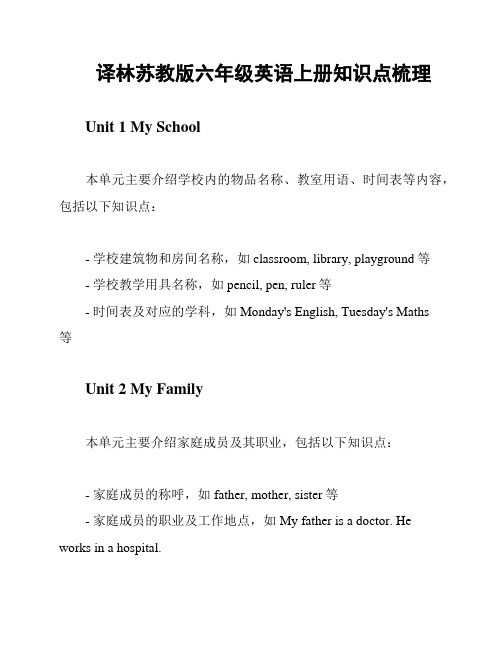
译林苏教版六年级英语上册知识点梳理Unit 1 My School本单元主要介绍学校内的物品名称、教室用语、时间表等内容,包括以下知识点:- 学校建筑物和房间名称,如classroom, library, playground等- 学校教学用具名称,如pencil, pen, ruler等- 时间表及对应的学科,如Monday's English, Tuesday's Maths等Unit 2 My Family本单元主要介绍家庭成员及其职业,包括以下知识点:- 家庭成员的称呼,如father, mother, sister等- 家庭成员的职业及工作地点,如My father is a doctor. He works in a hospital.Unit 3 My Friends本单元主要介绍朋友的外貌特征、兴趣爱好、所在地等内容,包括以下知识点:- 描述人的外貌特征,如长相、身高等,如He is tall and has short hair.- 描述人的兴趣爱好及所在地,如My friend likes playing football. He is from Beijing.Unit 4 My Day本单元主要介绍一天中不同时间和活动,包括以下知识点:- 时间表及活动名称,如9 o'clock, have breakfast等- 询问时间的用语,如What time is it?等Unit 5 My Weekends本单元主要介绍周末活动,包括以下知识点:- 周末不同活动名称,如watch TV, go swimming等- 动词-ing形式及其用法,如playing、watching等Unit 6 My Holidays本单元主要介绍不同假期的活动及地点,包括以下知识点:- 不同假期及其名称,如Summer Holiday, Spring Festival等- 假期活动及地点,如I'll go camping in the mountains during the summer holidays.Unit 7 My Body本单元主要介绍人体不同部位和器官及其用途,包括以下知识点:- 人体不同部位的名称,如head, arm, leg等- 器官及其作用,如The heart pumps blood around my body.Unit 8 My Food本单元主要介绍不同食物和饮料,包括以下知识点:- 不同的食物和饮料名称,如hamburger, sandwich, milk等- 句型What would you like?及其回答,如I'd like a pizza, please. Unit 9 My Clothes本单元主要介绍不同衣服及其颜色,包括以下知识点:- 不同的衣服名称,如T-shirt, dress, shoes等- 颜色名称,如red, blue, yellow等Unit 10 My House本单元主要介绍房屋不同部位及其名称,包括以下知识点:- 房屋不同部位的名称,如living room, bedroom, kitchen等- 物品名称,如sofa, bed, fridge等。
苏教版 译林版 小学英语六年级上册第4单元知识点(6A Unit4)
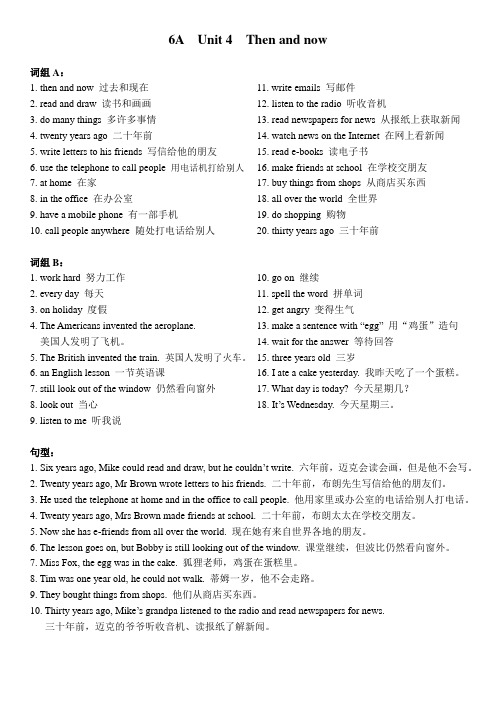
6A Unit 4 Then and now 词组A:1. then and now 过去和现在2. read and draw 读书和画画3. do many things 多许多事情4. twenty years ago 二十年前5. write letters to his friends 写信给他的朋友6. use the telephone to call people 用电话机打给别人7. at home 在家8. in the office 在办公室9. have a mobile phone 有一部手机10. call people anywhere 随处打电话给别人11. write emails 写邮件12. listen to the radio 听收音机13. read newspapers for news 从报纸上获取新闻14. watch news on the Internet 在网上看新闻15. read e-books 读电子书16. make friends at school 在学校交朋友17. buy things from shops 从商店买东西18. all over the world 全世界19. do shopping 购物20. thirty years ago 三十年前词组B:1. work hard 努力工作2. every day 每天3. on holiday 度假4. The Americans invented the aeroplane.美国人发明了飞机。
5. The British invented the train. 英国人发明了火车。
6. an English lesson 一节英语课7. still look out of the window 仍然看向窗外8. look out 当心9. listen to me 听我说10. go on 继续11. spell the word 拼单词12. get angry 变得生气13. make a sentence with “egg”用“鸡蛋”造句14. wait for the answer 等待回答15. three years old 三岁16. I ate a cake yesterday. 我昨天吃了一个蛋糕。
英语6年级上册苏教版
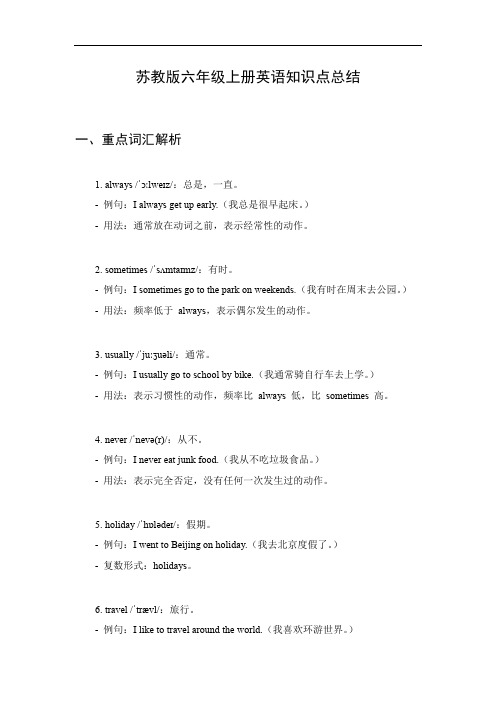
苏教版六年级上册英语知识点总结一、重点词汇解析1. always /ˈɔːlweɪz/:总是,一直。
-例句:I always get up early.(我总是很早起床。
)-用法:通常放在动词之前,表示经常性的动作。
2. sometimes /ˈsʌmtaɪmz/:有时。
-例句:I sometimes go to the park on weekends.(我有时在周末去公园。
)-用法:频率低于always,表示偶尔发生的动作。
3. usually /ˈjuːʒuəli/:通常。
-例句:I usually go to school by bike.(我通常骑自行车去上学。
)-用法:表示习惯性的动作,频率比always 低,比sometimes 高。
4. never /ˈnevə(r)/:从不。
-例句:I never eat junk food.(我从不吃垃圾食品。
)-用法:表示完全否定,没有任何一次发生过的动作。
5. holiday /ˈhɒlədeɪ/:假期。
-例句:I went to Beijing on holiday.(我去北京度假了。
)-复数形式:holidays。
6. travel /ˈtrævl/:旅行。
-例句:I like to travel around the world.(我喜欢环游世界。
)-现在分词:travelling / traveling。
二、重点句型1. What do you usually do on weekends?(你通常在周末做什么?)-回答:I usually + 动词原形+ 其他.(我通常……)-例如:I usually go shopping on weekends.(我通常在周末去购物。
)2. How often do you go to the park?(你多久去一次公园?)-回答:I go to the park + 频率副词.(我……去公园。
苏教版小学六年级英语上册单词汇总(加音标)译林版
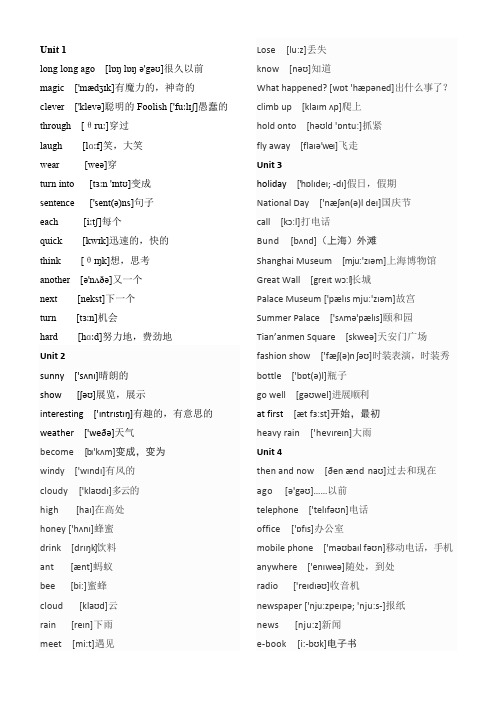
Unit 1long long ago [lɒŋ lɒŋ ə'gəʊ]很久以前magic ['mædʒɪk]有魔力的,神奇的clever ['klevə]聪明的Foolish ['fuːlɪʃ]愚蠢的through [θruː]穿过laugh [lɑːf]笑,大笑wear [weə]穿turn into [tɜːn 'ɪntʊ]变成sentence ['sent(ə)ns]句子each [iːtʃ]每个quick [kwɪk]迅速的,快的think [θɪŋk]想,思考another [ə'nʌðə]又一个next [nekst]下一个turn [tɜːn]机会hard [hɑːd]努力地,费劲地Unit 2sunny ['sʌnɪ]晴朗的show [ʃəʊ]展览,展示interesting ['ɪntrɪstɪŋ]有趣的,有意思的weather ['weðə]天气become [bɪ'kʌm]变成,变为windy ['wɪndɪ]有风的cloudy ['klaʊdɪ]多云的high [haɪ]在高处honey ['hʌnɪ]蜂蜜drink [drɪŋk]饮料ant [ænt]蚂蚁bee [biː]蜜蜂cloud [klaʊd]云rain [reɪn]下雨meet [miːt]遇见Lose [luːz]丢失know [nəʊ]知道What happened? [wɒt 'hæpəned]出什么事了?climb up [klaɪm ʌp]爬上hold onto [həʊld 'ɒntuː]抓紧fly away [flaɪə'weɪ]飞走Unit 3holiday ['hɒlɪdeɪ; -dɪ]假日,假期National Day ['næʃən(ə)l deɪ]国庆节call [kɔːl]打电话Bund [bʌnd](上海)外滩Shanghai Museum [mjuː'zɪəm]上海博物馆Great Wall [greɪt wɔːl]长城Palace Museum ['pælɪs mjuː'zɪəm]故宫Summer Palace ['sʌmə'pælɪs]颐和园Tian’anmen Square [skweə]天安门广场fashion show ['fæʃ(ə)n ʃəʊ]时装表演,时装秀bottle ['bɒt(ə)l]瓶子go well [gəʊwel]进展顺利at first [æt fɜːst]开始,最初heavy rain ['hevɪreɪn]大雨Unit 4then and now [ðen ænd naʊ]过去和现在ago [ə'gəʊ]……以前telephone ['telɪfəʊn]电话office ['ɒfɪs]办公室mobile phone ['məʊbaɪl fəʊn]移动电话,手机anywhere ['enɪweə]随处,到处radio ['reɪdɪəʊ]收音机newspaper ['njuːzpeɪpə; 'njuːs-]报纸news [njuːz]新闻e-book [i:-bʊk]电子书make friends [meɪk frendz]]交朋友all over the world [ɔːl 'əʊvəðəwɜːld]全世界do shopping [duː'ʃɒpɪŋ]购物TV ['ti:'vi:]电视look out of [lʊk aʊt əv]朝……外看What day is today? [wɒt deɪɪz tə'deɪ]今天是星期几?go on [gəʊɒn]继续spell [spel]拼读,拼写make a sentence [meɪk ə'sent(ə)ns]造句with [wɪð]用yesterday ['jestədeɪ]昨天Unit 5Sign [saɪn]标识shopping centre ['ʃɒpɪŋ'sentə]购物中心careful ['keəfʊl; -f(ə)l]小心,当心What does it mean? [wɒt dʌz ɪt miːn]这是什么意思?mean [miːn]意思是litter ['lɪtə]乱扔垃圾go in [gəʊɪn]进入,走进take [teɪk]携带restaurant ['restərɒŋ]饭店,餐厅smoke [sməʊk]吸烟,抽烟someone ['sʌmwʌn]某人smell [smel]闻到No eating or drinking. [nəʊ'iːtɪŋɔː'drɪŋkɪŋ]请勿饮食。
(完整word版)苏教版小学六年级英语上册单词汇总(加音标)译林版
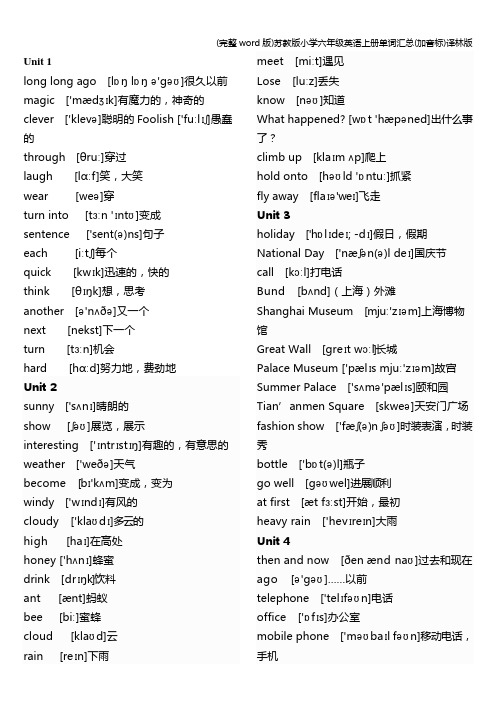
Unit 1long long ago [lɒŋ lɒŋə'gəʊ]很久以前magic ['mædʒɪk]有魔力的,神奇的clever ['klevə]聪明的Foolish ['fuːlɪʃ]愚蠢的through [θruː]穿过laugh [lɑːf]笑,大笑wear [weə]穿turn into [tɜːn 'ɪntʊ]变成sentence ['sent(ə)ns]句子each [iːtʃ]每个quick [kwɪk]迅速的,快的think [θɪŋk]想,思考another [ə'nʌðə]又一个next [nekst]下一个turn [tɜːn]机会hard [hɑːd]努力地,费劲地Unit 2sunny ['sʌnɪ]晴朗的show [ʃəʊ]展览,展示interesting ['ɪntrɪstɪŋ]有趣的,有意思的weather ['weðə]天气become [bɪ'kʌm]变成,变为windy ['wɪndɪ]有风的cloudy ['klaʊdɪ]多云的high [haɪ]在高处honey ['hʌnɪ]蜂蜜drink [drɪŋk]饮料ant [ænt]蚂蚁bee [biː]蜜蜂cloud [klaʊd]云rain [reɪn]下雨meet [miːt]遇见Lose [luːz]丢失know [nəʊ]知道What happened? [wɒt 'hæpəned]出什么事了?climb up [klaɪm ʌp]爬上hold onto [həʊld 'ɒntuː]抓紧fly away [flaɪə'weɪ]飞走Unit 3holiday ['hɒlɪdeɪ; -dɪ]假日,假期National Day ['næʃən(ə)l deɪ]国庆节call [kɔːl]打电话Bund [bʌnd](上海)外滩Shanghai Museum [mjuː'zɪəm]上海博物馆Great Wall [greɪt wɔːl]长城Palace Museum ['pælɪs mjuː'zɪəm]故宫Summer Palace ['sʌmə'pælɪs]颐和园Tian’an men Square [skweə]天安门广场fashion show ['fæʃ(ə)n ʃəʊ]时装表演,时装秀bottle ['bɒt(ə)l]瓶子go well [gəʊwel]进展顺利at first [æt fɜːst]开始,最初heavy rain ['hevɪreɪn]大雨Unit 4then and now [ðen ænd naʊ]过去和现在ago [ə'gəʊ]……以前telephone ['telɪfəʊn]电话office ['ɒfɪs]办公室mobile phone ['məʊbaɪl fəʊn]移动电话,手机anywhere ['enɪweə]随处,到处radio ['reɪdɪəʊ]收音机newspaper ['njuːzpeɪpə; 'njuːs-]报纸news [njuːz]新闻e-book [i:-bʊk]电子书make friends [meɪk frendz]]交朋友all over the world [ɔːl 'əʊvəðəwɜːld]全世界do shopping [duː'ʃɒpɪŋ]购物TV ['ti:'vi:]电视look out of [lʊk aʊt əv]朝……外看What day is today? [wɒt deɪɪz tə'deɪ]今天是星期几?go on [gəʊɒn]继续spell [spel]拼读,拼写make a sentence [meɪk ə'sent(ə)ns]造句with [wɪð]用yesterday ['jestədeɪ]昨天Unit 5Sign [saɪn]标识shopping centre ['ʃɒpɪŋ'sentə]购物中心careful ['keəfʊl; -f(ə)l]小心,当心What does it mean? [wɒt dʌz ɪt miːn]这是什么意思?mean [miːn]意思是litter ['lɪtə]乱扔垃圾go in [gəʊɪn]进入,走进take [teɪk]携带restaurant ['restərɒŋ]饭店,餐厅smoke [sməʊk]吸烟,抽烟someone ['sʌmwʌn]某人smell [smel]闻到No eating or drinking.[nəʊ'iːtɪŋɔː'drɪŋkɪŋ]请勿饮食。
苏教版小学六年级上册英语知识点总结及复习要点
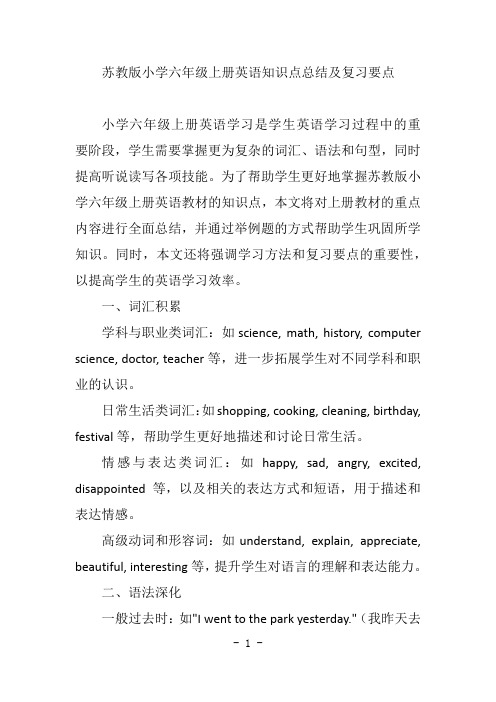
苏教版小学六年级上册英语知识点总结及复习要点小学六年级上册英语学习是学生英语学习过程中的重要阶段,学生需要掌握更为复杂的词汇、语法和句型,同时提高听说读写各项技能。
为了帮助学生更好地掌握苏教版小学六年级上册英语教材的知识点,本文将对上册教材的重点内容进行全面总结,并通过举例题的方式帮助学生巩固所学知识。
同时,本文还将强调学习方法和复习要点的重要性,以提高学生的英语学习效率。
一、词汇积累学科与职业类词汇:如science, math, history, computer science, doctor, teacher等,进一步拓展学生对不同学科和职业的认识。
日常生活类词汇:如shopping, cooking, cleaning, birthday, festival等,帮助学生更好地描述和讨论日常生活。
情感与表达类词汇:如happy, sad, angry, excited, disappointed等,以及相关的表达方式和短语,用于描述和表达情感。
高级动词和形容词:如understand, explain, appreciate, beautiful, interesting等,提升学生对语言的理解和表达能力。
二、语法深化一般过去时:如"I went to the park yesterday."(我昨天去了公园。
)学生需要理解并掌握一般过去时的动词形式和用法。
现在完成时与过去完成时的对比:如"I have already finished my homework."(我已经完成了我的作业。
)和"I had finished my homework before you came."(你来之前我已经完成了作业。
)学生需要理解并掌握两种时态的区别和用法。
条件状语从句的进一步应用:如"If I had more time, I would travel around the world."(如果我有更多的时间,我会环游世界。
苏教版译林小学英语六年级上册 Unit 6 知识点总结
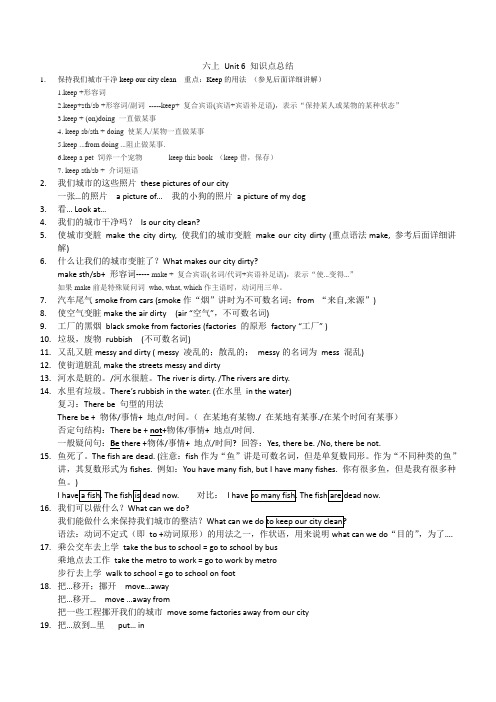
六上Unit 6 知识点总结1.保持我们城市干净keep our city clean 重点:Keep的用法(参见后面详细讲解)1.keep +形容词2.keep+sth/sb +形容词/副词-----keep+ 复合宾语(宾语+宾语补足语),表示“保持某人或某物的某种状态”3.keep + (on)doing 一直做某事4. keep sb/sth + doing 使某人/某物一直做某事5.keep ...from doing ...阻止做某事.6.keep a pet 饲养一个宠物keep this book (keep借,保存)7. keep sth/sb + 介词短语2.我们城市的这些照片these pictures of our city一张…的照片 a picture of…我的小狗的照片a picture of my dog3.看… Look at…4.我们的城市干净吗?Is our city clean?5.使城市变脏make the city dirty, 使我们的城市变脏make our city dirty (重点语法make, 参考后面详细讲解)6.什么让我们的城市变脏了?What makes our city dirty?make sth/sb+ 形容词----- make + 复合宾语(名词/代词+宾语补足语),表示“使…变得…”如果make前是特殊疑问词who, what, which作主语时,动词用三单。
7.汽车尾气smoke from cars (smoke作“烟”讲时为不可数名词;from “来自,来源”)8.使空气变脏make the air dirty (air “空气”,不可数名词)9.工厂的黑烟black smoke from factories (factories 的原形factory “工厂” )10.垃圾,废物rubbish (不可数名词)11.又乱又脏messy and dirty ( messy 凌乱的;散乱的;messy的名词为mess 混乱)12.使街道脏乱make the streets messy and dirty13.河水是脏的。
苏教版六年级上册英语知识点
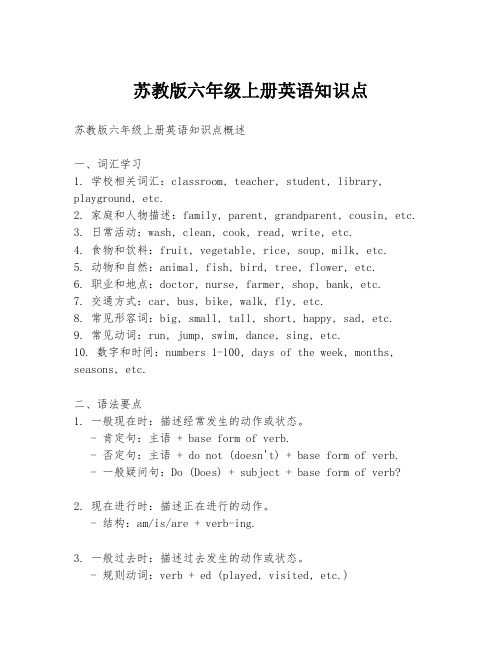
苏教版六年级上册英语知识点苏教版六年级上册英语知识点概述一、词汇学习1. 学校相关词汇:classroom, teacher, student, library, playground, etc.2. 家庭和人物描述:family, parent, grandparent, cousin, etc.3. 日常活动:wash, clean, cook, read, write, etc.4. 食物和饮料:fruit, vegetable, rice, soup, milk, etc.5. 动物和自然:animal, fish, bird, tree, flower, etc.6. 职业和地点:doctor, nurse, farmer, shop, bank, etc.7. 交通方式:car, bus, bike, walk, fly, etc.8. 常见形容词:big, small, tall, short, happy, sad, etc.9. 常见动词:run, jump, swim, dance, sing, etc.10. 数字和时间:numbers 1-100, days of the week, months, seasons, etc.二、语法要点1. 一般现在时:描述经常发生的动作或状态。
- 肯定句:主语 + base form of verb.- 否定句:主语 + do not (doesn't) + base form of verb.- 一般疑问句:Do (Does) + subject + base form of verb?2. 现在进行时:描述正在进行的动作。
- 结构:am/is/are + verb-ing.3. 一般过去时:描述过去发生的动作或状态。
- 规则动词:verb + ed (played, visited, etc.)- 不规则动词:irregular past tense forms (went, saw, etc.)4. 可数名词和不可数名词的使用。
苏教版最新译林版六年级上册6A英语知识点1(良心出品必属精品)
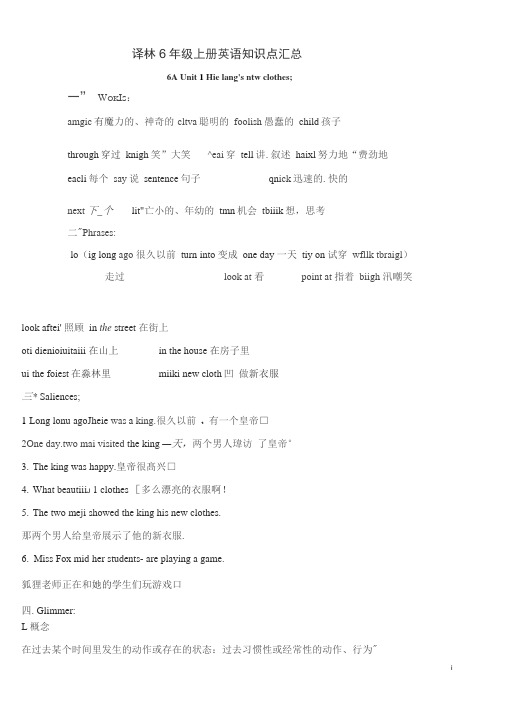
译林6年级上册英语知识点汇总6A Unit 1 Hie lang's ntw clothes;一” W OK I S:amgic有魔力的、神奇的cltva聪明的foolish愚蠢的child孩子through穿过knigh笑”大笑^eai穿tell讲.叙述haixl努力地“费劲地eacli每个say说sentence句子qn ick迅速的.快的next下_个lit"亡小的、年幼的tmn机会tbiiik想,思考二"Phrases:lo(ig long ago 很久以前turn into 变成one day 一天tiy on 试穿wfllk tbraigl)走过look at 看point at 指着biigh 汛嘲笑look aftei' 照顾in the street 在街上oti dienioiuitaiii 在山上in the house 在房子里ui the foiest在淼林里miiki new cloth凹做新衣服三* Saliences;1 Long lonu agoJheie was a king.很久以前t有一个皇帝□2One day.two mai visited the king —天,两个男人瑋访了皇帝°3.The king was happy.皇帝很髙兴□4.What beautiii J1 clothes [多么漂亮的衣服啊!5.The two meji showed the king his new clothes.那两个男人给皇帝展示了他的新衣服.6.Miss Fox mid her students- are playing a game.狐狸老师正在和她的学生们玩游戏口四.Glimmer:L概念在过去某个时间里发生的动作或存在的状态:过去习惯性或经常性的动作、行为"2■时间状语agoyesteiday^die day before yesfteiJayJast weekfrearjnglitjnoiilh.. .),ni 1989just now J oiig long ago. once upon a time.左肯定句主语卄亍为动词(过去式)+其他口例如;I was bcxn in 1998 我在1998年出生。
苏教版 译林版 小学英语六年级上册第2单元知识点(6A Unit2)
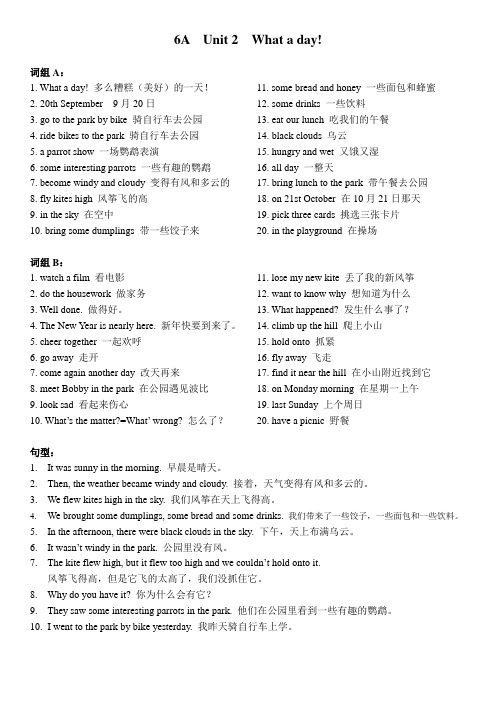
6A Unit 2 What a day! 词组A:1. What a day! 多么糟糕(美好)的一天!2. 20th September 9月20日3. go to the park by bike 骑自行车去公园4. ride bikes to the park 骑自行车去公园5. a parrot show 一场鹦鹉表演6. some interesting parrots 一些有趣的鹦鹉7. become windy and cloudy 变得有风和多云的8. fly kites high 风筝飞的高9. in the sky 在空中10. bring some dumplings 带一些饺子来11. some bread and honey 一些面包和蜂蜜12. some drinks 一些饮料13. eat our lunch 吃我们的午餐14. black clouds 乌云15. hungry and wet 又饿又湿16. all day 一整天17. bring lunch to the park 带午餐去公园18. on 21st October 在10月21日那天19. pick three cards 挑选三张卡片20. in the playground 在操场词组B:1. watch a film 看电影2. do the housework 做家务3. Well done. 做得好。
4. The New Year is nearly here. 新年快要到来了。
5. cheer together 一起欢呼6. go away 走开7. come again another day 改天再来8. meet Bobby in the park 在公园遇见波比9. look sad 看起来伤心10. What’s the matter?=What’ wrong? 怎么了?11. lose my new kite 丢了我的新风筝12. want to know why 想知道为什么13. What happened? 发生什么事了?14. climb up the hill 爬上小山15. hold onto 抓紧16. fly away 飞走17. find it near the hill 在小山附近找到它18. on Monday morning 在星期一上午19. last Sunday 上个周日20. have a picnic 野餐句型:1.It was sunny in the morning. 早晨是晴天。
江苏译林版英语六年级(上册)知识总结与归纳
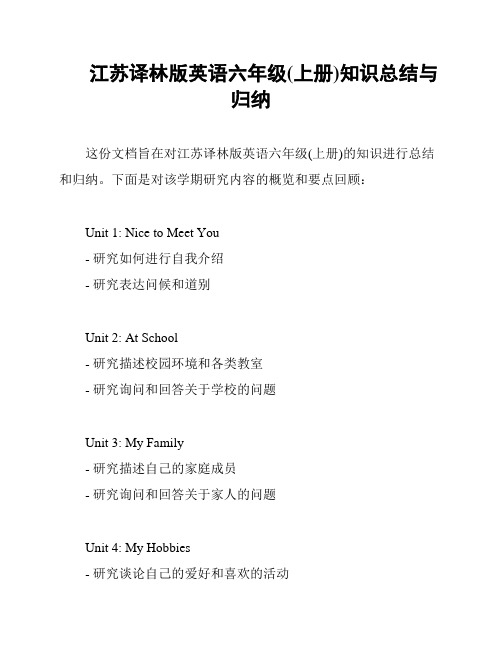
江苏译林版英语六年级(上册)知识总结与
归纳
这份文档旨在对江苏译林版英语六年级(上册)的知识进行总结和归纳。
下面是对该学期研究内容的概览和要点回顾:
Unit 1: Nice to Meet You
- 研究如何进行自我介绍
- 研究表达问候和道别
Unit 2: At School
- 研究描述校园环境和各类教室
- 研究询问和回答关于学校的问题
Unit 3: My Family
- 研究描述自己的家庭成员
- 研究询问和回答关于家人的问题
Unit 4: My Hobbies
- 研究谈论自己的爱好和喜欢的活动
- 研究询问和回答关于兴趣爱好的问题
Unit 5: Food and Drinks
- 研究讨论食物和饮料
- 研究询问和回答关于喜欢和不喜欢的食物的问题
Unit 6: At the Zoo
- 研究描绘动物和它们的性
- 研究询问和回答关于动物园的问题
Unit 7: My Week
- 研究描述一周中的活动和日程安排
- 研究询问和回答关于日程安排的问题
总结以上内容,六年级上册的研究内容围绕自我介绍、学校、家庭、爱好、食物、动物以及时间安排展开。
通过这些研究,学生们能够提高英语口语表达能力,并且了解更多有关这些主题的词汇和句型。
希望这份文档对大家有所帮助!
(字数:204字)。
苏教版六年级上册英语复习资料
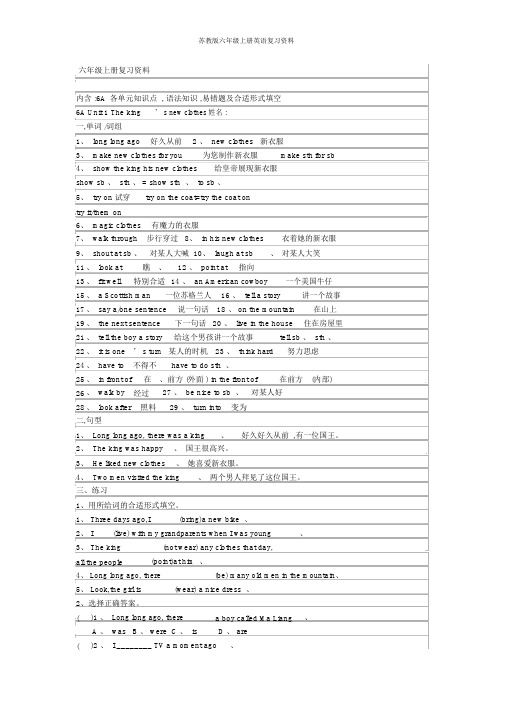
苏教版六年级上册英语复习资料六年级上册复习资料内含 :6A各单元知识点 , 语法知识 ,易错题及合适形式填空6A Unit 1 The king’ s new clothes姓名 :一,单词 /词组1、 long long ago好久从前 2 、 new clothes 新衣服3、 make new clothes for you为您制作新衣服make sth for sb4、 show the king his new clothes给皇帝展现新衣服show sb 、 sth 、 = show sth、 to sb 、5、 try on 试穿try on the coat=try the coat ontry it/them on6、 magic clothes有魔力的衣服7、 walk through步行穿过8、 in his new clothes衣着她的新衣服9、 shout at sb 、对某人大喊 10、 laugh at sb、对某人大笑11、 look at瞧、12 、 point at指向13、 fit well特别合适14 、 an American cowboy一个美国牛仔15、 a Scottish man一位苏格兰人16 、 tell a story讲一个故事17、 say a/one sentence说一句话18 、 on the mountain在山上19、 the next sentence下一句话20 、 live in the house住在房屋里21、 tell the boy a story给这个男孩讲一个故事tell sb 、 sth 、22、 it is one’ s turn某人的时机23 、 think hard努力思虑24、 have to不得不have to do sth 、25、 in front of在、前方 (外面 ) in the front of在前方(内部)26、 walk by经过27 、 be nice to sb 、对某人好28、 look after照料29 、 turn into变为二,句型1、 Long long ago, there was a king、好久好久从前 ,有一位国王。
苏教版译林六年级英语上册知识点归纳
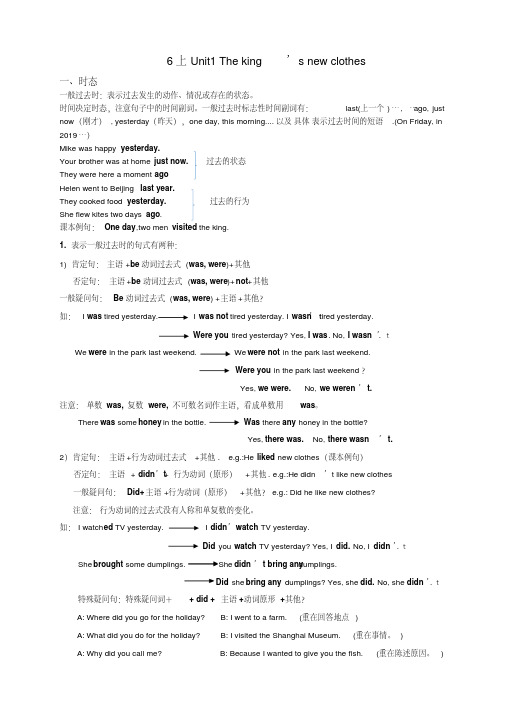
6上Unit1 The king’s new clothes一、时态一般过去时:表示过去发生的动作、情况或存在的状态。
时间决定时态,注意句子中的时间副词。
一般过去时标志性时间副词有:last(上一个)…, …ago, just now(刚才), yesterday(昨天),one day, this morning....以及具体表示过去时间的短语.(On Friday, in 2019…)Mike was happy yesterday.Your brother was at home just now.过去的状态They were here a moment agoHelen went to Beijing last year.They cooked food yesterday. 过去的行为She flew kites two days ago.课本例句:One day,two men visited the king.1. 表示一般过去时的句式有两种:1)肯定句:主语+be动词过去式(was, were)+其他否定句:主语+be动词过去式(was, were)+not+其他一般疑问句:Be动词过去式(was, were) +主语+其他?如:I was tired yesterday. I was not tired yesterday. I wasn’ttired yesterday..Were you tired yesterday? Yes, I was. No, I wasn’tWe were in the park last weekend. We were not in the park last weekend.Were you in the park last weekend?Yes, we were. No, we weren’t.注意:单数was, 复数were, 不可数名词作主语,看成单数用was。
- 1、下载文档前请自行甄别文档内容的完整性,平台不提供额外的编辑、内容补充、找答案等附加服务。
- 2、"仅部分预览"的文档,不可在线预览部分如存在完整性等问题,可反馈申请退款(可完整预览的文档不适用该条件!)。
- 3、如文档侵犯您的权益,请联系客服反馈,我们会尽快为您处理(人工客服工作时间:9:00-18:30)。
Unit 1 The king’s new clothes一,单词/词组1. long long ago 很久以前2. new clothes 新衣服3. make new clothes for you 为你制作新衣服make sth for sb4. show the king his new clothes给皇帝展示新衣服show sb. sth.= show sth. to sb.5.try on 试穿try on the coat=try the coat on try it/them6. magic clothes 有魔力的衣服>7. walk through步行穿过8. in his new clothes 穿着他的新衣服9. shout at sb. 对某人大叫10. laugh at sb. 对某人大笑11. look at 看….12. point at 指向…13. fit well 非常适合14. an American cowboy 一个美国牛仔15. a Scottish man 一位苏格兰人16. tell a story 讲一个故事17. say a/one sentence 说一句话18. on the mountain 在山上19. the next sentence 下一句话20. live in the house 住在房子里21. tell the boy a story 给这个男孩讲一个故事tell sb. sth.'22. it is one’s turn 某人的机会23. think hard 努力思考24. have to 不得不have to do sth.25. in front of 在….前面(外部)in the front of 在… 前面(内部)26. walk by 路过27. be nice to sb. 对某人好28. look after 照顾29. turn into 变成二,句型1. Long long ago, there was a king. 很久很久以前,有一位国王。
2. The king was happy. 国王很开心。
(3. He liked new clothes. 他喜欢新衣服。
4. Two men visited the king. 两个男人拜访了这位国王。
三、练习1.用所给词的适当形式填空。
days ago,I (bring)a new bike.(live) with my grandparents when I was young.king (not wear) any clothes that day,all the people (point)at him.:long ago, there (be) many old men in the mountain.,the girl is (wear) a nice dress.2.选择正确答案。
( )1. Long long ago, there a boy called Ma Liang.A. wasB. wereC. isD. are ( )2. I ________ TV a moment ago.A. watchB. watchedC. lookedD. look ( )3. The teacher the blackboard, then we copied the words.¥at B. pointed at pointing at D. points at( )4. Do you want ________A. visit the forestB. visiting the forestC. to visiting the forestD. to visit the forest( )5. Each student one picture.A. drawB. drawsC. drawingD. to drawing ( )6. She usually _______ new clothes his doll.A. makes…withB. make…forC. makes…forD. make…with@( )7. The lion always walks ______ the forest every day.A. onB. underC. throughD. behind ( )8. Were there ________ people in the streetA. someB. anyC. muchD. a ( )9. What ________ beautiful girl!A. / B an C. a D. the ( )10. The shoes are very cool, but they me.A. are fittingB. fitC. don’t fitD. fitted…Unit 2 What a day!一,单词/词组What a day! 糟糕的一天;忙碌的一天;累人的一天等等(表达的含义很多,根据具体语境来看)这里指“糟糕的一天”1. the 19th of September 在九月十九号2. a sunny/ windy / rainy day 晴朗的/ 刮风/下雨的一天*3. a lot of rain 许多雨(不可数)4. a lot of snow 许多雪(不可数)5. see/ watch a parrot show 观看一场鹦鹉表演6. see some interesting parrots看见一些有趣的鹦鹉7. an interesting film 一部精彩的电影8. become windy and cloudy变成大风和阴天(多云)9. fly kites high in the sky风筝放得高10. bring some dumplings带来一些饺子11. bring lunch 带午餐12. some bread and honey 一些面包和蜂蜜13. some drinks 一些饮料14. hungry and thirsty 又饿又渴15. wet clothes 潮湿的衣服16. have/ eat our lunch吃我们的午饭17. black clouds乌云$18. meet me/ him/ her/ them/ you 遇见我/他/ 她/ 他们/ 你19. look sad/ happy 看起来很伤心/ 开心20. this morning/ afternoon/ evening 今天早晨/ 下午/ 晚上21. climb up the hill 爬上山22. get up at seven 七点起床23. go to school by bike 骑自行车去上学24. have a picnic野餐25. watch a film看电影26. in the sky在空中27. all day 一整天28. go away 走了29. lose my kite丢了我的风筝30. want to know why想要知道为什么31. what happened出了什么事·32. fly too high飞得太高33. find it 找到它34. near the hill 在小山附近35. in your diary 在你的日记里词组(三会)1. hold onto it抓紧它2. fly away飞走了3. find it near the hill在山的附近找到它4. in your diary在你的日记里5. cheer together一起欢呼二、句型:1、今天的天气怎么样是晴朗的。
"A:How’s the weather today B: It’s sunny. T he weather is sunny.2、昨天的天气怎么样是下雨的。
A; What was the weather like yesterday B : It was rainy. The weather was rainy.3、我看见一些有趣的鹦鹉。
We saw some interesting parrots.4、我们上周日放风筝了。
We flew kites last Sunday.5、昨天他带来了一些饮料,面包和蜂蜜。
He brought some drinks, bread and honey yesterday.6、两天前她带来了一些水饺。
She brought some dumplings two days ago.(7、昨天下雨了。
It rained 、Why do you have it你怎么会拿到它的三、语法1、过去时态:本课出现的动词不规则变化(同学们要反复朗读)give- gave lose- lost become- became hold- held fly- flewcome- came bring- brought buy- brought see- sawwrite- wrote can- could find- found meet- met2、rainy - 下雨的(形容词)3、snowy- 下雪的(形容词)rain snow](1)名词:雨(不可数): a lot of rain (1)名词:雪(不可数): a lot of snow(2)动词:下雨(2)动词:下雪例句:a) It rained yesterday. 昨天下雨了。
b) Look! It is raining now! 看!现在正在下雨。
c) It often rains here. 这儿经常下雨。
d) It’s often rainy.经常下雨了。
3. by bike 骑自行车和ride a bike 骑自行车的区别:[by bike 属于副词短语,指的是交通方式,比如说别人问,你一般上学用什么交通工具,你回答“I go to school by bike”,而ride a bike 属于动词短语,指的是动作,别人问你说,你在干吗你说:“I am riding a bike”(正在骑车)而不能说I am by bike,因为by bike 是指交通方式。
四,练习1.找出与所给单词的划线部分读音相同的单词。
dear arm near pear cake bear tape hardhear wearcard name2.根据首字母填空(8分)’s a w’s fly kites.@am thirsty,I need something to d .were many clouds in the sky ,it was c yesterday.Today it is r ,you should take an umbrella.mother t me a story every day when I was a c .Sunday we f kites in the park.3.填空( )1. like to wear a kilt.A. The ChineseB. The ScottishC. The AmericanD. The English ( )2. Yesterday Nancy was sick, her mother her carefully.)A. looked afterB. looked atC. looked forD. looked out( )3. The witch(女巫) the prince the lion.A. turned …onB. talked…with…C. told…toD. turned…intoUnit 3 Holiday fun一,单词、词组1. come back to school 返校2. the National Day holiday 国庆节假期3. call you 打电话给你4. visit my aunt拜访我的婶婶—5. Shanghai Museum上海博物馆6. see many interesting things看见很多有趣的东西7. go to a farm 去农场8. near Star Lake 在星湖附近9. pick some oranges摘一些橙子10. go fishing去钓鱼11. catch a big fish抓到一条大鱼12. Tian’anmen Square天安门广场13. Palace Museum故宫博物院14. Summer Palace 颐和园15. the Great Wall长城/16. pick an orange for me为我摘一个橙子17. main school holidays学校主要的假期18. the Easter holiday复活节假期19. the summer holiday暑假20. the Christmas holiday圣诞节假期21. come home late晚回家22. have a fashion show有一场时装秀23. love beautiful clothes爱漂亮的衣服:24. be excited about the show 对秀感到激动25 wear paper clothes 穿纸衣服26. wear a lot of bottles穿很多瓶子27. ask about the show询问关于秀的事28. go well进展顺利29. at first在开始的时候30. heavy rain大雨31. the Car Museum轿车博物馆<32. visit his cousin拜访他的表兄33. have a birthday party举行一个生日聚会34. catch a fish for me为我抓一条鱼二,动词过去式catch---caught eat---ate get---got meet---met lose---lost hold---held find---found 三.重点句型:1. What did you do for the holiday2. How was your holiday It was great fun.《3. Why did you call meBecause I wanted to give the fish to you.4. What great fun!5. It is time for dinner.拓展:1. excited / exciting I’m excited at the exciting running race.四.练习一、单项选择@( ) 1. What did you do _______ your holidayA. toB. withC. for( )2. He _______to the cinema every Sunday morning.A. goB. goesC. going( )3. We _______ in the cinema yesterday.A. wasn’tB. didn’tC. weren’t( )4. I called you ________ I wanted to give you the fish.A. aboutB. ofC. because,( )5. ______ there ________ fruit trees on the farmA. Were, anyB. Are, anyC. Are, some( ) 6. Look! He ‘s____________ about the show.A. excitedB. excitingC. excite( ) 7. Jack came ________ home at five this afternoon.A. back toB. backC. to( ) 8. - The parrot can speak to me on the show.-_____________—A. Thank you very much.B. That’s a good idea.C. What great fun. ( )9. Did Sam ______ paper clothes yesterday afternoonA. woreB. wearC. wearing( ) 10. The show went _______________.A. goodB. niceC. well二、完成句子。
